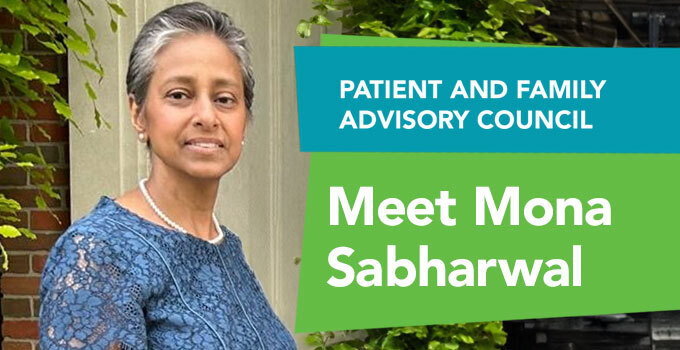Mona Sabharwal is the newest member of OICR’s Patient and Family Advisory Council.
Mona Sabharwal never had any doubt that patients have an important perspective to contribute to healthcare research and policy.
In fact, Sabharwal helped bring patient voices into Ontario’s drug-funding decisions when she worked in policy for the provincial Ministry of Health in the early 2000s – long before patient partnership was common practice.
But it wasn’t until Sabharwal was diagnosed with acute myeloid leukemia in March 2023 and became a patient partner herself that she truly understood the patient perspective, and the vulnerability that comes with sharing it.
“When you’re asked to contribute to a research or policy initiative as a patient, you often don’t know the full context or the people involved, and you sometimes question whether they’re actually interested in what you have to say,” says Sabharwal, a pharmacist who is currently Senior Vice President at Rexall Pharmacy Group. “I look back at some of my interactions with patients when I was on the other side and wonder: is that how I made them feel?”
It’s that experience from both sides of patient partnership that drives Sabharwal. Though she says patient partnership has evolved immensely since the early 2000s, she believes patients can still do more to influence the care they receive.
Sabharwal joined OICR’s Patient and Family Advisory Council (PFAC) earlier this year. She recently spoke to OICR News about her experiences as a patient, pharmacist and policy expert, and how she hopes to apply them to improve cancer research.
How has your professional experience, as a pharmacist and in health policy, influenced your experience as a patient?
My experience and understanding of the healthcare system has empowered me to advocate for myself. When someone says ‘you can’t do that’ I have no problem asking why. I also know some of the levers within the health system, which has been helpful as I fight for my life against this disease. But I recognize that not everyone has this privilege, and that’s part of why I became a patient partner.
Has research played a role in your own experience with cancer?
I’ve been a participant in a few research projects as part of my cancer care. The experience has been positive overall – I think I benefitted from participating, and I hope others will benefit as well. But there were opportunities for improvement.
For example, one study tried to recruit me while I was very, very sick during treatment. I think most people would have declined in that situation. Then another study just stopped providing me with any updates once my participation was over. I received no feedback or follow-up information, even though my data became part of their dataset.
I’ve learned from these situations and look forward to applying that knowledge as part of OICR’s PFAC to help others have even more positive experiences.
What are your goals as a member of OICR’s PFAC?
I firmly believe that patients who participate in research are going to receive better care than if they didn’t. I believed that before I had cancer, and it has only been reinforced during my cancer journey. I would like to bring those advantages to light, and help more cancer patients access research.
I would also like to see patients play a bigger role in advocating for cancer research. It’s very compelling for policymakers and other decision makers to hear from the people who receive and benefit from research.
How has your experience with PFAC been so far?
OICR is leaps and bounds over many organizations that work with patients. Having staff members dedicated to patient partnership, as OICR does, is a huge step forward and really demonstrates the Institute’s commitment.
At the same time, I think there’s more that can be done. I’d like to see OICR continue to lead and continue to be bolder. Why not push the envelope a little more on how patients and family members can influence the health system?

